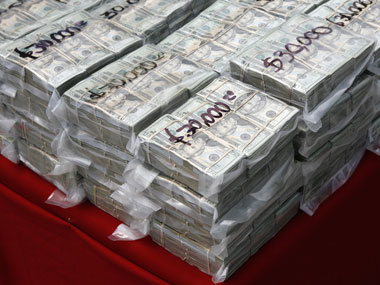Sandeep Dikshit, MP, and son of Delhi Chief Minister Sheila Dikshit, is an extraordinary man. He held Rs 10 lakh for safe-keeping on behalf of a friend while travelling on the Bhopal Express and then forgot all about it. He detrained and left it behind. Another extraordinary man, a railway attendant who worked the air-conditioned coupe, spotted the cash and told television channels later that he had “no greed for money”. He counted 10 bundles of Rs 1000, each of them with 100 notes, and handed it over to the police. Which means, to the high and mighty as well as the lowliest, such money means nothing. But the story gets murkier when you realise why the money was left with Dikshit. [caption id=“attachment_85078” align=“alignleft” width=“380” caption=“Sandeep Dikshit, MP, and son of Delhi Chief Minister Sheila Dikshit, held Rs 10 lakh for safe-keeping on behalf of a friend while travelling on the Bhopal Express and then forgot all about it. He detrained and left it behind. Reuters”]  [/caption] For one, his architect friend was going to buy an apartment with it. That is, it was a part-payment. If it was in cash, then the payment was off-the-account books that the taxman would want to examine. It also meant it was not going to reflect in the books of the builder-developer or the seller of the apartment. That is how high-level business has always been done in India – by keeping substantial parts of big-ticket transactions from the eyes of the law. If it had been a clean deal, the friend intending to buy an apartment would have issued a cheque or procured a demand draft and be done with it. Obviously, it was not the preferred option. Two, the MP knew about it, and is nonchalant about it. Here comes the twist. Sandeep Dikshit was the man who worked the back channel negotiations on behalf of the government with Anna Hazare, often to be seen at Ramlila Maidan, sometimes even providing some sound bytes to ever-hungry news television crews. With his natty kurta-pajama, probably bought from the designer shops or the Delhi Haat, he blended with the crowds rooting for Hazare on the anti-graft issue. He is one of those who helped convince Hazare that the government was serious about meeting his concerns and most of the major issues would be addressed in Parliament’s “Sense of the House” motion. Dikshit is no run-of-the-mill politician. He is credited with the first sub-national Human Development Report, for having worked on development for a decade-and-a-half in Rajasthan, Gujarat, Punjab, Madhya Pradesh and Chhattisgarh. This gave him a connect with the Hazare crowd – NGO type to NGO type. He headed the civil society group, Sanket. But obviously, he is only a helpful MP, inclined to wink at dubious practices. Also, he has been elected from the East Delhi constituency and is familiar with the issues that really concern the common man: graft as a major detractor of equity, a destroyer of good governance. He also spoke eloquently on the Lokpal Bill when Parliament debated it. But it appears that it made no difference to the man: a friend buying a property would be paying in black. It was no skin off his nose and he did not mind holding it in safe custody during his travel time on Bhopal Express. Though Rs 10 lakh in these inflation-ridden days is nothing to choke a horse, it makes one thing clear. If even clean-cut MPs are of this ilk, how do we trust them? Especially, when he was a behind-the-scenes negotiator for a deal with anti-corruption crusader Anna Hazare? Probably, post-Lokpal, life would continue like this. And leave the common people raging and fussing helplessly.
Should the man who spoke so eloquently about the need to contain corruption be carrying his friend’s cash for a black money transaction?
Advertisement
End of Article
Written by Mahesh Vijapurkar
Mahesh Vijapurkar likes to take a worm’s eye-view of issues – that is, from the common man’s perspective. He was a journalist with The Indian Express and then The Hindu and now potters around with human development and urban issues. see more


)
)
)
)
)
)
)
)
)



